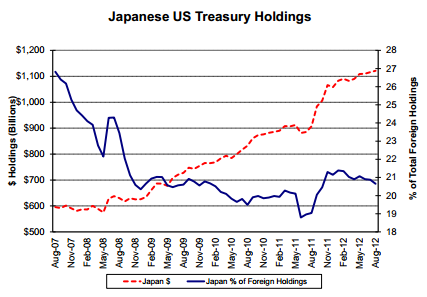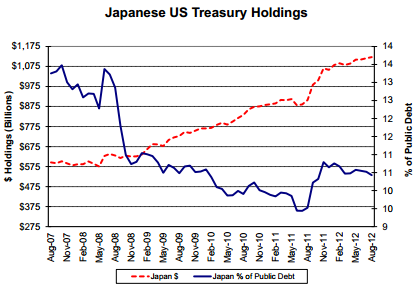Eliminate the public debt of the United States at once, and do the same with Great Britain, Italy, Germany, Japan, Greece. At the same time revive the ‘ economy, stabilize prices and oust the bankers. In a clean and painless, and faster than what you can imagine. With a magic wand? No. With a simple law, but able to replace the current system, in which to create money out of nothing are private banks. We only need a measure requiring the banks to hold a financial reserve real, 100%. To propose two economists at the International Monetary Fund, Jaromir Bene and Michael Kumhof. You, the bank, you want to make money on the loan of money? First you have to prove it really that much money. Too easy to have it by the central bank (which the factory from scratch) and then “extort” families, businesses and entire states, imposing exorbitant interest.
The study of two economists, “The Chicago Plan Revisited,” with “a revolutionary and” scandalous “‘Maria Grazia Bruzzone,” La Stampa “, emphasizes the global resonance of the dossier, that bursts like a bomb on the world capitalist system now jammed. The global debt came the exorbitant sum of 200 trillion, that is 200 trillion dollars, while the world GDP is less than 70 trillion. Translated: the world debt is 300% of gross domestic product of the entire planet. “And to hold this huge mountain of debt – which continues to grow – there are more advanced economies and developing countries,” says the Bruzzone, stressing that “the heart of the problem and the cross” is the highest “power” Japan, Europe and the United States. Hence the sortie “heretical” by Bene and Kumhof: simply write off the debt, it disappears.Sparked the debate was the last IMF report, which points the finger on austerity policies aimed at reducing thepublic debt . Policies that “could lead to recession in the economies ‘, since’ cuts and tax increases depress the ‘economy ‘.
Not only. The IMF would be really worried the crisis that is ravaging the ‘ Europe threatens to be worse than the 2008 financial. The surprise is that even the IMF now thinks that “austerity can be used to justify the privatization of public services,” with consequences “potentially disastrous”. But if the problem is the debt – public, but now “privatized” by finance – you can not delete? Solution already ventilated by the Bank of England, which holds 25% of the British sovereign debt: the Bank of England may reset it by clicking on the computer. Advantages: “You will pay much less interest, it would free up cash and you could make less harsh austerity.” The debate rages on many media, starting from the same “Financial Times”. thread which breaks now the revolutionary proposal of the two IMF economists targati: cancel the debt.
“The Chicago Plan Revisited,” writes Maria Grazia Bruzzone, raises and explores the “Chicago Plan” original, drawn up in the middle of the Great Depression of the ’30s by two other economists, Irving Fisher, Henry Simons of the University of Chicago, the cradle of liberalism . Cancel 100% of the debt? “The trick is to replace our system, where money is created by private banks – for 95-97% of the supply of money – money created by the state. It would mean return to the historical norm, before the English King Charles II put in private hands control of the money available, “back in 1666. It would mean a frontal assault on the “fractional reserve” banking, accused of seigniorage on the issue of currency speculation: if lenders are instead forced to hold 100% of its reserves to guarantee deposits and loans, “pardon the exorbitant privilege of create money out of nothing. ” As a result: “The nation regained control over the availability of money,” and also “reduces the pernicious cycles of expansion and contraction of credit.”
The authors of the first “Plan of Chicago” had thought that the cycles of expansion and contraction of credit lead to an unhealthy concentration of wealth: “They had seen in the early thirties creditors seize farmers effectively bankrupt, grab their lands or comprarsele for a piece of bread. ” Today, the authors of the new edition of this plan argue that the “trauma” of the credit cycle that expands and contracts – caused by private money creation – is a historical fact that is already outlined with Jubilees Debt ancient Mesopotamia, as well as in ancient Greece and even Rome. Sovereign control (the state or the Pope) on currency, recalls Bruzzone, Britain remained so throughout the Middle Ages, until 1666, when it began the era of the cycles of expansion and contraction. With the “bank privatization” of money, add the “Telegraph”, “opened the way for the agricultural revolution, and after the industrial revolution and the biggest leap Economic ever seen “- but it is not the case of” quibbling, “quips the newspaper.
According to the young economists of the IMF, is just a myth – disclosed “innocently” by Adam Smith – that the money has been developed as a medium of exchange based on gold, or related to it. Just as it is a myth, the study points out the IMF, what you learn from books: that is the Fed, the U.S. central bank, to control the creation of the dollar. “In fact, money is created by private banks to 95-97% through loans.” Private banks, in fact, do not lend as owners of cash deposits, the process is exactly the opposite. “Every time a bank makes a loan, the computer writes the loan (plus interest) and the corresponding liability in its balance sheet. But the money that pays the bank has a small part. If it does borrow from another bank, or by the central bank. And the central bank, in turn, creates out of nothing that lends the money to the bank. ”
In the current system, in fact, the bank is not required to have its own reserves – except for a tiny fraction of what it provides. Under a system of “fractional reserve”, each money created out of nothing is a debt equivalent: “Which produces an exponential increase in the debt, to the point that the system collapses on itself.” The economists of the IMF hours overturn the situation. The key is the clear distinction between the amount of money and the amount of credit between money creation and lending. If you impose banks to lend only numbers covered by actual reserves, loans would be fully funded from reserves or profits accrued. At that point, the banks can no longer create new money out of thin air. Generate profits through loans – without actually having a cash reserve – is “an extraordinary and exclusive privilege, denied to other business.”
“The banks – says Maria Grazia Bruzzone – would become what he mistakenly believed to be, pure intermediaries who have to get out their funds to be able to make loans.” In this way, the U.S. Federal Reserve “is approprierebbe for the first time the control over the availability of money, making it easier to manage inflation.” In fact, it is observed that the central bank would be nationalized, becoming a branch of the Treasury, and now the Fed is still owned by private banks. “Nationalizing” the Fed, the huge national debt would turn into a surplus, and the private banks’ should borrow reserves to offset possible liabilities. ” Already wanted to do John Fitzgerald Kennedy, who began to print – at no cost – “dollars of the Treasury,” against those “private” by the Fed, but the challenge of JFK died tragically, as we know, under the blows of the killer of Dallas , quickly stored from “amnesia” of powerful debunking.
Sovereign coin, issued directly by the government, the state would no longer be “liable”, but it would become a “creditor”, able to buy private debt, which would also be easily deleted. After decades, back on the field the ghost of Kennedy. In short: even the economists of the IMF hours espouse the theory of Warren Mosler, who are fighting for their monetary sovereignty as a trump card to go out – once and for all – from financial slavery subjecting entire populations, crushed by the crisis , the hegemonic power of a very small elite of “rentiers”, while the ‘ economic reality – with services cut and the credit granted in dribs and drabs – simply go to hell. And ‘the cardinal assumption of Modern Money Theory supported in Italy by Paul Barnard: if to emit “money created out of nothing” is the state, instead of banks, collapsing the blackmail of austerity that impoverishes all, immeasurably enriching only parasites of finance . With currency sovereign government can create jobs at low cost. That is, welfare, income and hope for millions of people, with a guaranteed recovery of consumption. Pure oxygen ‘s economy . Not surprisingly, adds Bruzzone, if already the original “Chicago Plan”, as approved by committees of the U.S. Congress, never became law, despite the fact that they were caldeggiarlo well 235 academic economists, including Milton Friedman and English liberal James Tobin, the father of the “Tobin tax”. In practice, “the plan died because of the strong resistance of the banking sector.” These are the same banks, the journalist adds the “Print”, which today recalcitrano ahead to reserve requirements a bit ‘higher (but still of the order of 4-6%) required by the Basel III rules, however, insufficient to do deterrent in the event of a newcrisis . Banks: “The same who spend billions on lobbying and campaign contributions to presidential candidates. And in front of the new “Chicago Plan” threaten havoc and that “it would mean changing the nature of western capitalism. ‘” That may be true, admits Bruzzone: “Maybe but it would be a better capitalism. And less risky. ”



